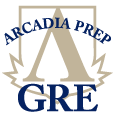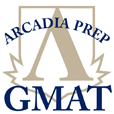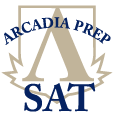Links
About Arcadia
LSAT Shorthand NotationArcadia Prep's GMAT CourseArcadia Prep's LSAT CourseArcadia Prep's SAT CourseArcadia Prep's GRE CourseThe Simply Brilliant GMAT AppAbout the MCATMCAT Physical and Biological SciencesAbout Arcadia Prep's MCAT CourseTerms of SaleTerms of UseAbout Arcadia Apps




LSAT Prep

Taylor: Researchers at a local university claim that61 percent of the information ... ...
The statements above provide the most support for
holding that Sandra would disagree with Taylor about
which one of the following statements?
(A) Research might reveal that 61 percent of the information taken in during a conversation is communicated through nonverbal signals.
(B) ...
(C) ...
(D) ...
(E) ...
*This question is included in Sample Lesson Set 1: Basic Questions
(A) Research might reveal that 61 percent of the information taken in during a conversation is communicated through nonverbal signals.
(B) ...
(C) ...
(D) ...
(E) ...
*This question is included in Sample Lesson Set 1: Basic Questions
Replies to This Thread: 0 | ----
Isn't it opinionated that the vas difference in scientific phenomena is probable to the division of the evolution to times distress itself?

Replies to This Thread: 0 | ----
Since this is a "Disagree" question, your job is to find the area of conflict between the two arguments (Taylor's and Sandra's).
For these questions, you shouldn't really be focusing on the quality of the arguments, so the fact that you find one of the arguments to be opinionated shouldn't come into play here.
For these questions, you shouldn't really be focusing on the quality of the arguments, so the fact that you find one of the arguments to be opinionated shouldn't come into play here.
Replies to This Thread: 0 | ----
Wouldn't Sandra actually agree with Taylor if he espoused this opinion? It seems that the question is worded backwards. Taylor would be the one disagreeing on this point, no?

Replies to This Thread: 0 | ----
Taylor's argument rests on the following claim: all mathematically precise claims are suspect, because science cannot produce results with "exactitude". ("Exactitude" can mean exactness, precision or accuracy.)
Then Sandra comes along and says: (1.) some scientific disciplines DO produce extremely precise results, and (2.) results should not be doubted simply because they are precise.
So, as we can see, the argument is really about whether or not science can legitimately produce very precise results. Sandra thinks that it can, and Taylor thinks it cannot.
As for the wording of the question stem, it could be worded either way.
Whether it says:
"Taylor would disagree with Sandra about which of the following statements?"
OR
"Sandra would disagree with Taylor about which of the following statements?"
you still have the same answer, because the point of disagreement is the same.
Then Sandra comes along and says: (1.) some scientific disciplines DO produce extremely precise results, and (2.) results should not be doubted simply because they are precise.
So, as we can see, the argument is really about whether or not science can legitimately produce very precise results. Sandra thinks that it can, and Taylor thinks it cannot.
As for the wording of the question stem, it could be worded either way.
Whether it says:
"Taylor would disagree with Sandra about which of the following statements?"
OR
"Sandra would disagree with Taylor about which of the following statements?"
you still have the same answer, because the point of disagreement is the same.

Replies to This Thread: 0 | ----
Why would Sandra disagree with taylor about that statement? It goes along exactly with what she believes. She believes that many of the scientific disciplines can produce exact results. This statement seems to be one in which Taylor would disagree with Sandra not the other way around.
Replies to This Thread: 1 | ----
An explanation of the question stem.
This post attempts to answer Crystal's question, as well as the anonymous question that was posted later.
This post attempts to answer Crystal's question, as well as the anonymous question that was posted later.
I can't hear anything with this attachment

Reply 1 of 1
Replies to This Thread: 0 | ----
Posted: 01/01/2012 17:08
Replies to This Thread: 0 | ----
Ramon,
The animation is only available through Arcadia iPhone/iPad app. When you play it, please make sure the phone is not muted.
- ArcadiaPrep Team.
The animation is only available through Arcadia iPhone/iPad app. When you play it, please make sure the phone is not muted.
- ArcadiaPrep Team.
Replies to This Thread: 1 | ----
Hi there is is anyone taking the December LSAT ?
Reply 1 of 1
Replies to This Thread: 0 | ----
Posted: 10/22/2011 19:57
Replies to This Thread: 0 | ----
I'm taking it December 3rd!
Replies to This Thread: 0 | ----
Hi there is anyone taking the LSAT in December ?
Replies to This Thread: 0 | ----
Yes, I'm taking the December LSAT.
Replies to This Thread: 0 | ----
This answer would be correct if the question was posed as which statement "Taylor would disagree with Sandra about." But since it was posed as "which statement Sandra would disagree with Taylor about" we assumed that the statements in question would be said by Taylor. Sandra would most certainly not disagree with Taylor were she to say statement C.
If the question were posed as, "Which statement the two speakers were most likely to disagree about," then answer C would be correct.
If the question were posed as, "Which statement the two speakers were most likely to disagree about," then answer C would be correct.
Replies to This Thread: 0 | ----
I dont get this one...If I can reword Sandras argument: "scientists can get really precise results, even though they are not precise....". An oxymoron on itself....






